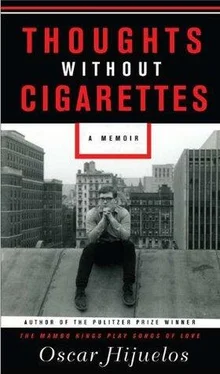I do remember a closet. Since so many infant patients came and went from that place, the children of the ward were dressed in the cast-offs of the children who had preceded them; this apparel was stored in an immense-seeming walk-in wardrobe, smelling of lacquered pine, with shelves that were piled high with trousers and shirts and other items. One day, as a nurse fitted me into a pair of corduroys with a snap-button fly and pull-up straps and a striped shirt, she started barking at me in English to step forward, to lift my arms — commands that I apparently did not respond to quickly enough, for, as I remember, she pushed me inside that closet and slammed the door behind her, leaving me in the dark for what might have been only a few minutes but seemed to me an interminably long time: In the darkness, I worried that those clothes would come to life and, lifting off the shelves like spirits, come tumbling down to smother me. As for being locked inside? It surely reminded me that I was not at home in Manhattan, nor in my auntie Cheo’s house in Holguín, nor by the beautiful Cuban sea, nor out in Oriente, dazzled by the evening sky, nor, for that matter, out on our front stoop, sitting beside my father as he smoked cigarettes, watching kids play on the street, or walking somewhere with my mother, whose faces, by then, I could barely recall.
Instead, in its pitch-blackness, it seemed a deep and endless space through which one might fall, or from whose depths might emerge monsters. Shell-shocked, and wishing that someone — my mother, my father, anyone — would come to my rescue, I knocked on the door until that nurse finally opened it, then scolded me about behaving better, to pay attention to her when she was telling me something, and, for crying out loud, to stop being so dense and learn to answer her in English. I don’t know how many times this kind of scene played itself out over those long months, but I have a general recollection of feeling a sense of dread (as if the walls would fall on me), harangued (as if I had to watch my every word), and maligned for my ignorance of English.
And my mother? Once I started getting better, it was she, but never my brother, who would be allowed into an inner playroom to spend time with me. While she sat on a bench along a wall, I’d play with some toys by her feet. She always seemed to be talking about something, and frantically — I wish I knew now just what she’d said; occasionally, she’d lean forward to move some blocks around, but I hardly seemed aware of her. She must have at least smiled at me now and then and perhaps affectionately so, but though she may have wanted to hold me, it wasn’t allowed — touching was forbidden. Other parents too, I recall, gathered in that room. I’ve since often wondered what she made of them or might have said to them if she could have managed more than a few phrases in English and shared her worries.
Visiting me and finding that I seemed to have withdrawn into myself, what else could she do but stare at me with dismay, shaking her head at this puzzling sea change, or else sit back in her chair in frustration? What else could she do but sigh, her striking dark eyes widening, as she muttered something under her breath? That same puzzlement would always enter her voice when she’d address me in the future, “ Me entiendes? ”—“Do you understand me?”—becoming one of the stock phrases she’d use to punctuate our every conversation, as if her own son had become a stranger who’d suddenly dropped into her life, an americano whose timidity and fears she needlessly (and perhaps selfishly) confused with laziness (“You didn’t want to speak Spanish after all!”) or with aloofness (“ Por qué me miras así? ”—“Why do you look at me that way?”).
I’d often turn away from her, or shrug, or pretend that she wasn’t there. It must have killed her.
On one of those afternoons, however, deep into my stay at the hospital, I was allowed to leave the ward and go outside for a while. I know this because of a photograph, the only one I’ve ever had to commemorate my stay at that convalescent home. I’m in a heavy coat, bloated and lost and seemingly staggered by the brilliance of spring, my distinctly rounded, very pale face partially washed out by the sun, nothing less than a child’s apprehension and bewilderment contorting my mouth. Someone, perhaps a family friend like mi padrino Horacio, had snapped it, since my father, in all that time, never once came to see me, and my mother didn’t know how to — for I had never seen her take, in all my life, a single photograph (she was not that way). But thank God someone did, for after so many years, even that memory, of me standing in a field, would, like so many other things about that time, have likely been forgotten.
Eventually, there came the day I left Connecticut and found myself in a taxi with my mother crossing 125th Street over to the West Side from Lenox Avenue, where we’d gotten off a New York Central Railroad train. It must have been close to Christmas, for the store windows blinked with colored lights, and pine trees for sale lined the streets. Across the intersections hung banners and enormous glass and wire snowflakes, and here and there along the Harlem sidewalks, vendors were out hawking dolls and toys and all kinds of household goods, crowds of people bumping into each other, enchanting me. I know I wore a heavy wool coat with a hood because my mother kept tightening the cords each time I squirmed about while trying to loosen them from around my jacket collar, and, as would happen a thousand times in the future, she told me, pulling my hands away, “Stop that! Or you’ll get sick again!” Then, just like that, we were on our way up that long hill on Amsterdam and making a left onto 118th, our six-story tenement building being the fourth one along that block on the uptown side. As we stopped in front of its gray Doric-columned stoop, screaming kids were inside playing running games like tag and hide in the front hall, among them little Jeanie Walker, the deaf lady’s daughter, a little slow in the head but her pretty and expressive face breaking out into a huge grin of happiness at the sight of me: First thing she did was to wrap her arms around me in a hug, but just the same, I had trouble placing her.
Our apartment, number 2, was the first one to the left once you had climbed a few marble steps inside the mirrored hallway. I don’t know just what I should have felt when my mother pushed open the front door and I saw a framed picture of Jesus with his burning heart in hand, but it was my brother, José, who led me down that hallway to the kitchen, with its buckling linoleum floors, its pipes covered in rust and mold, and walls streaked with amber trails left by the cockroaches at night. Off my parents’ bedroom and directly above our basement boiler, the kitchen’s floors were shaking as I walked in. I’m pretty sure it was a weekend day that I arrived, but I can’t really say — only that my father, Pascual, or papi, was sitting by our Formica-covered table with some of his friends.
“ Recuerdas a tu papá? ” my mother asked me, just as he looked over at me. “Remember your father?” With his heavyset melancholy Gallego face, he seemed friendly enough, and because I did not know what else to do, I ran into his arms, his huge hands gently caressing my back, his eyes, always sad in memory, almost filling with tears over the fact of my miraculous return. My mother then told me, “ Dale un beso ”—“Give him a kiss”—and as I did, my face pressing up against his, a strong scent of tobacco and booze mixed with Old Spice cologne rose into my nostrils. Maybe he had asked me, “ Cómo andas, hijo? ”—“How are you, son?”—or said, “I’m so happy to see you at home,” in English. Perhaps he had an early Christmas gift for me, some toy he would have gotten downtown; perhaps he introduced me to his Mexican buddy, Mr. Daniel Martinez, superintendent from up the street, with his languid jowl-laden face and mariner’s tattoo on his forearm, or maybe his drinking pal supreme, Frankie the Puerto Rican exterminator, was on hand; perhaps a man I knew only as Díaz, one of my father’s fellow cooks from the Biltmore, a dead-on Cuban look-alike for the actor Lon Chaney Jr., also sat by that table — but who knows, it was so long ago. Of one thing I’m fairly certain: My father, in the company of friends and in clouds of cigarette smoke, had exuded, while embracing me, something I hadn’t felt in a long time, a simple kindness, which I hungered for; or perhaps, as I sometimes think now, it was pity.
Читать дальше












